

Pomp and Coincidence - NYTimes.com. List of Famous IQ's Page II of IV - IQ of Famous People. This is page two of four pages of famous people who have high IQ's.

Some of the famous people are still living and some are deceased and many have left their mark on history. This is a very large web page and if you do not have a fast Internet connection, please be patient, it may take up to 15 seconds to load. We have a new webpage of 112 famous people and their IQ scores, to see these IQ score, please refer to our page on famous IQs. Disclaimer! We receive a lot of email questioning the validity of famous IQ scores - especially for people who lived long before the first intelligence test was developed.
The Calculated IQ Estimates for 301 Historic Geniuses is also also known as "The Early Mental Traits of Three Hundred Geniuses. " For more information on Catherine Cox please refer to the Wikipedia reference and the Indiana University reference. More Famous IQ's The Past and Present IQ's of Famous People Albert Einstein IQ Score 160 Albrecht Haller IQ Score 190 Alexander Pope IQ Score 180. William James Sidis. Biography[edit] Parents and upbringing (1898–1909)[edit] William James Sidis was born to Jewish Ukrainian immigrants on April 1, 1898, in New York City. His father Boris Sidis, Ph.D., M.D., had emigrated in 1887 to escape political persecution. His mother Sarah Mandelbaum Sidis, M.D., and her family had fled the pogroms in 1889. Julian Huxley. Huxley was well known for his presentation of science in books and articles, and on radio and television.
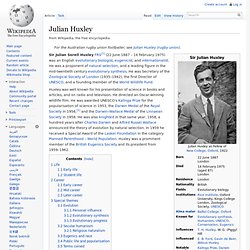
He directed an Oscar-winning wildlife film. He was awarded UNESCO's Kalinga Prize for the popularisation of science in 1953, the Darwin Medal of the Royal Society in 1956,[1] and the Darwin–Wallace Medal of the Linnaean Society in 1958. He was also knighted in that same year, 1958, a hundred years after Charles Darwin and Alfred Russel Wallace announced the theory of evolution by natural selection. In 1959 he received a Special Award of the Lasker Foundation in the category Planned Parenthood – World Population. Huxley was a prominent member of the British Eugenics Society and its president from 1959–1962. Teleology. Teleology was explored by Plato and Aristotle, by Saint Anselm during the 11th century AD, in the late 18th century by Immanuel Kant as a regulative principle in his Critique of Judgment and by Carl Jung.
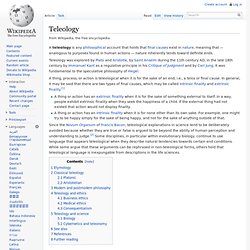
It was fundamental to the speculative philosophy of Hegel. A thing, process, or action is teleological when it is for the sake of an end, i.e., a telos or final cause. In general, it may be said that there are two types of final causes, which may be called intrinsic finality and extrinsic finality.[1] A thing or action has an extrinsic finality when it is for the sake of something external to itself. Democritus. Democritus (/dɪˈmɒkrɪtəs/; Greek: Δημόκριτος Dēmókritos, meaning "chosen of the people"; c. 460 – c. 370 BC) was an influential Ancient Greek pre-Socratic philosopher.
He is primarily remembered today for his formulation of an atomic theory of the universe.[3] Democritus was born in Abdera, Thrace[4] around 460 BC. His exact contributions are difficult to disentangle from those of his mentor Leucippus, as they are often mentioned together in texts. Their speculation on atoms, taken from Leucippus, bears a passing and partial resemblance to the nineteenth-century understanding of atomic structure that has led some to regard Democritus as more of a scientist than other Greek philosophers; however, their ideas rested on very different bases.[5] Largely ignored in ancient Athens, Democritus was nevertheless well known to his fellow northern-born philosopher Aristotle.
UNESCO. The flag of UNESCO.
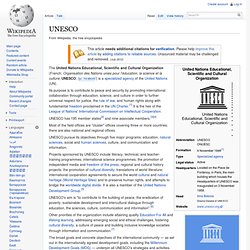
The United Nations Educational, Scientific and Cultural Organization (French: Organisation des Nations unies pour l'éducation, la science et la culture; UNESCO; /juːˈnɛskoʊ/) is a specialized agency of the United Nations (UN). UNESCO has 195 member states[2] and nine associate members.[3][4] Most of the field offices are "cluster" offices covering three or more countries; there are also national and regional offices. League of Nations. The League of Nations (abbreviated as LN in English, "Société des Nations" abbreviated as SDN in French) was an intergovernmental organisation founded as a result of the Paris Peace Conference that ended the First World War.
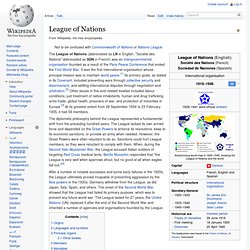
It was the first international organisation whose principal mission was to maintain world peace.[1] Its primary goals, as stated in its Covenant, included preventing wars through collective security and disarmament, and settling international disputes through negotiation and arbitration.[2] Other issues in this and related treaties included labour conditions, just treatment of native inhabitants, human and drug trafficking, arms trade, global health, prisoners of war, and protection of minorities in Europe.[3] At its greatest extent from 28 September 1934 to 23 February 1935, it had 58 members. The diplomatic philosophy behind the League represented a fundamental shift from the preceding hundred years. Aldous Huxley. Aldous Leonard Huxley /ˈhʌksli/ (26 July 1894 – 22 November 1963) was an English writer, philosopher and a prominent member of the Huxley family.
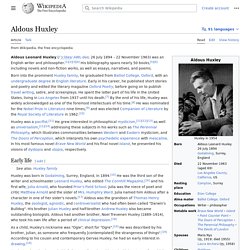
He was best known for his novels including Brave New World, set in a dystopian London, and for non-fiction books, such as The Doors of Perception, which recalls experiences when taking a psychedelic drug, and a wide-ranging output of essays. Early in his career Huxley edited the magazine Oxford Poetry, and published short stories and poetry. Mid career and later, he published travel writing, film stories and scripts. Thomas Henry Huxley. Huxley was slow to accept some of Darwin's ideas, such as gradualism, and was undecided about natural selection, but despite this he was wholehearted in his public support of Darwin.
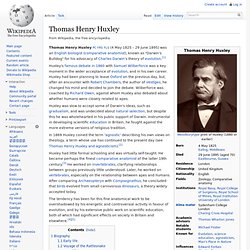
Instrumental in developing scientific education in Britain, he fought against the more extreme versions of religious tradition. Agnosticism. Agnosticism is the view that the truth values of certain claims—especially claims about the existence or non-existence of any deity, as well as other religious and metaphysical claims—are unknown or unknowable.[1][2][3] According to the philosopher William L.
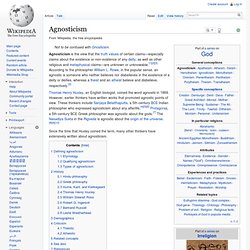
Rowe, in the popular sense, an agnostic is someone who neither believes nor disbelieves in the existence of a deity or deities, whereas a theist and an atheist believe and disbelieve, respectively.[2] Thomas Henry Huxley, an English biologist, coined the word agnostic in 1869. However, earlier thinkers have written works that promoted agnostic points of view. These thinkers include Sanjaya Belatthaputta, a 5th-century BCE Indian philosopher who expressed agnosticism about any afterlife,[4][5][6] Protagoras, a 5th-century BCE Greek philosopher was agnostic about the gods.[7] The Nasadiya Sukta in the Rigveda is agnostic about the origin of the universe.[8][9][10] Charles Darwin. Charles Robert Darwin, FRS (/ˈdɑrwɪn/;[1] 12 February 1809 – 19 April 1882) was an English naturalist and geologist,[2] best known for his contributions to evolutionary theory.
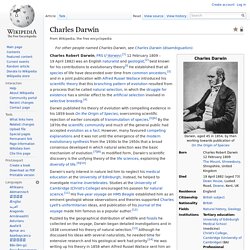
[I] He established that all species of life have descended over time from common ancestors,[3] and in a joint publication with Alfred Russel Wallace introduced his scientific theory that this branching pattern of evolution resulted from a process that he called natural selection, in which the struggle for existence has a similar effect to the artificial selection involved in selective breeding.[4] Darwin published his theory of evolution with compelling evidence in his 1859 book On the Origin of Species, overcoming scientific rejection of earlier concepts of transmutation of species.[5][6] By the 1870s the scientific community and much of the general public had accepted evolution as a fact.
Aldous Huxley on Eugenics. Leonard Huxley (writer) Leonard Huxley (11 December 1860 – 2 May 1933) was an English schoolteacher, writer and editor.
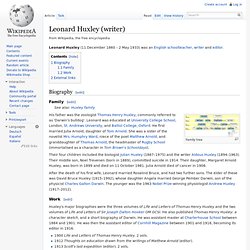
Family tree Their four children included the biologist Julian Huxley (1887–1975) and the writer Aldous Huxley (1894–1963). Andrew Huxley. Early life and education[edit] When he was about 12, Andrew and his brother David were given a lathe by their parents. Andrew soon became proficient at designing, making and assembling mechanical objects of all kinds, from wooden candle sticks to a working internal combustion engine. He used these practical skills throughout his career, building much of the specialized equipment he needed for his research. It was also in his early teens that he formed his lifelong interest in microscopy.[3] Career[edit] Having entered Cambridge in 1935, Huxley graduated with a bachelor's degree in 1938. Muscle contraction. Top-down view of skeletal muscle A muscle fiber generates tension when properly stimulated, for instance by the nervous system or by electrical impulses. This physiological process is called muscle contraction.
Action potential. As an action potential travels down the axon, there is a change in polarity across the membrane. The Na+ and K+ gated ion channels open and close as the membrane reaches the threshold potential, in response to a signal from another neuron. At the beginning of the action potential, the Na+ channels open and Na+ moves into the axon, causing depolarization. Repolarization occurs when the K+ channels open and K+ moves out of the axon. This creates a change in polarity between the outside of the cell and the inside. The impulse travels down the axon in one direction only, to the axon terminal where it signals other neurons. Action potentials are generated by special types of voltage-gated ion channels embedded in a cell's plasma membrane.[2] These channels are shut when the membrane potential is near the resting potential of the cell, but they rapidly begin to open if the membrane potential increases to a precisely defined threshold value.
Overview[edit] Huxley family. The Huxley family is a British family of which several members have excelled in scientific, medical, artistic, and literary fields. The family also includes members who occupied senior public positions in the service of the United Kingdom. Darwin–Wedgwood family. George Orwell. Buckminster Fuller. Dymaxion house. The Dymaxion House was developed by inventor and architect Buckminster Fuller to address several perceived shortcomings with existing homebuilding techniques. Fuller designed several versions of the house at different times, but they were all factory manufactured kits, assembled on site, intended to be suitable for any site or environment and to use resources efficiently.
List of polyglots. A polyglot is a person who uses multiple languages. A polyglot may also be called a multilingual person; the label "multilingual" is used for communities as well as individual speakers. Richard Hudson, professor emeritus of linguistics at University College London, coined the term "hyperpolyglot" for a person who can speak six or more languages fluently.[1] It is difficult to judge which individuals are polyglots, as there is no uncontroversial definition what it means to "master" a language. The Animate and the Inanimate. Christopher Langan. Langan_CTMU_092902.